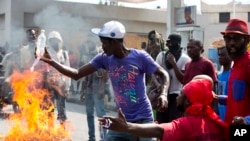The U.S. Department of State is authorizing "the voluntary departure of U.S. direct-hire government personnel and their family members" posted to the U.S. embassy in Haiti, a spokesperson for Western Hemisphere affairs told VOA.
The official said the decision was based on the "increased security unrest" and sometimes violent protests that have crippled Haiti's capital, Port-au-Prince, as well as other major cities during recent months.
As the popular Christmas holiday travel season gets under way, U.S. citizens considering travel to Haiti are advised to "reconsider." The State Department's travel advisory level remains at 3, and Americans are being asked to "review their personal safety and security plans."
The news comes as hundreds of protesters flooded the streets of Port-au-Prince again Sunday in the latest in a series of anti-corruption protests that also saw renewed calls for President Jovenel Moise to step down.
"It's about PetroCaribe!" a man yelled to VOA's Creole service as he marched down a street, tires burning in the background. He was referring to the popular protest movement that has swept the nation, demanding answers and government accountability for the alleged misuse of $3.8 billion. The money, due to Haiti under the PetroCaribe oil alliances signed between Venezuela and Caribbean nations in June 2005, had been designated for infrastructure and social and economic projects.
"Jovenel said he is going to put food on our plates; instead, he put tear gas. He said he'd put money in our pockets; instead, he's put bullet casings in our pockets. Work — what kind of work has Jovenel given us? Gangs who are killing us in the streets! We're asking God [to deliver us] ... we can't take it anymore!" a woman told VOA Creole. She said people in her neighborhood were unable to sleep at night because of all the criminal activity.
The opposition also joined the Sunday protest, renewing calls for political dialogue.
"Everyone sees there's nothing we can do with these people [the government]. ... We're here to say we are willing to sit together to resolve the country's problems, which should be done through a national conference," Marjorie Michel, a representative of an opposition sector, told VOA Creole.
But former congressman Serge Jean-Louis took a more hardline view of the ruling PHTK party.
"We say no! PHTK is not a party you can collaborate with — it's a party that tolerates gangs; it supports drug dealers — there's no beating breasts here — everyone needs to sit down and negotiate (to find a solution)," he said.
As protesters called for the president's resignation, Moise on Sunday visited Port-de-Paix, in Haiti's northwest, to attend festivities honoring the city's patron saint. During a speech to residents, he sought to reassure them that his campaign promises would be fulfilled before the end of his term.
"I'm not making promises," the president said, "this is a reality."
He also said, "Today it's all about Port-de-Paix. ... Don't let people tell you everything has to be done at once."
Meanwhile, it is not clear whether the Haitian diaspora will heed the travel warnings and U.S. advisories against visiting the Western Hemisphere's poorest country this month.
Jean Michel Mathurin, Matiado Vilme in Port-au-Prince and Dieuseul Junior Louis in Port-de-Paix contributed to this report.




